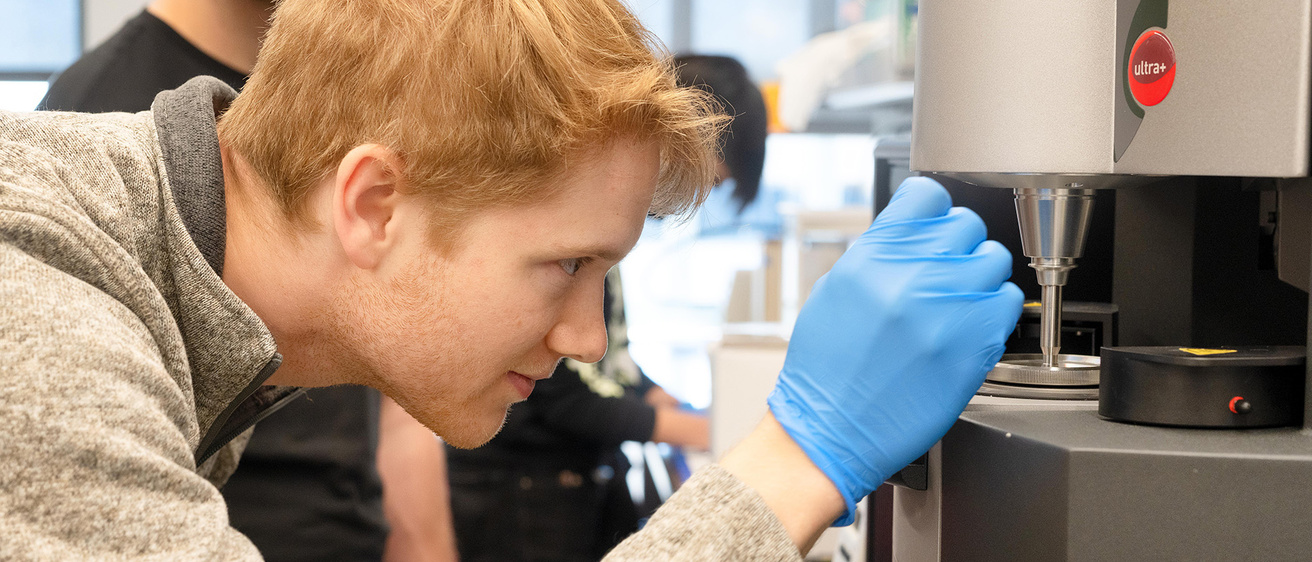Short answer: Lots of things! But let’s examine some of these options in greater detail.
A biomedical engineering degree can launch a career that blends purpose, innovation, and discovery. Whether you want to work in a hospital, a high-tech lab, or startup that aims to change the world, this degree will give you the tools to get there.
Is a biomedical engineering degree useful?
Absolutely. A biomedical engineering degree is like a Swiss army knife.
It can equip you with skills to:
- Design medical tools such as prosthetics, implants, or imaging systems.
- Conduct groundbreaking research in disease diagnosis and treatment.
- Improve patient care and health care systems through smart technology.
- Consult for hospitals, startups, or global health care companies.
5 %
for biomedical engineering jobs between 2024 and 2034, higher than the national average for all jobs
“The field of biomedical engineering continues to evolve quickly with advances in AI, wearable tech, and personalized medicine,” says Nicole Grosland, professor of biomedical engineering and associate dean for academic programs at the University of Iowa. “3D bioprinting, for example, is revolutionizing regenerative medicine, while digital tattoos provide a way to continuously monitor vital signs. The opportunities are endless.”
As health care becomes more tech-driven, the world needs professionals who can speak the languages of both biology and engineering. Let’s take a closer look at what you can do with this powerful degree.

“One skill that every engineer gains is the ability to solve problems. That’s probably a reason you are interested in the field in the first place, right? You love to tinker. You’re methodical about things, you have a process. You will develop and refine these traits in every biomedical engineering class you take, and you will apply these skills in whatever career you pursue.”
What can you do with a degree in biomedical engineering?
Whether you’re looking for entry-level biomedical engineering jobs or aiming for the best biomedical engineering jobs in the field, there’s no shortage of opportunities to make a real impact.
Depending on the type of biomedical engineering you pursue, some of the exciting paths you could take include:
- Clinical engineer: Make sure hospitals run smoothly with the latest tech.
- Instrumentation engineer: Develop new equipment and software used in the creation and production of medical devices.
- Manufacturing engineer: Develop and refine processes for manufacturing medical devices or products so they can be marketed.
- Medical device designer: Build tools that save lives, from pacemakers to robotic surgery systems.
- Quality engineer: Ensure that medical devices meet FDA standards for safety and efficacy.
- Regulatory affairs specialist: Help bring new medical products to market safely and legally.
- Rehabilitation engineer: Design, build, and adapt technology to help people with disabilities increase their functional abilities and independence.
- Research and development (R&D) engineer: Work in labs to invent the next big thing in biotech or pharma.
- Software engineer: Responsible for the analysis, design, programming, debugging, and modification of software applications and testing solutions.

Biomedical engineering job roles exist in a wide range of industries, including:
- Hospitals and health care systems
- Biotech and pharmaceutical companies
- Academic and government research labs
- Startups and innovation hubs
Some biomedical engineering positions may require a master’s degree or PhD. Depending on what you want to do, you also may consider pursuing an additional degree in an area such as patent law or entrepreneurship.
“There are lots of jobs that a BME graduate can obtain,” says Kim “Avrama” Blackwell, professor and departmental executive officer of biomedical engineering at the University of Iowa. “There are broad fields, such as in medical device design or the pharmaceutical industry, or bioinformatics and data analysis, or even clinical engineering. And within those broad fields, there are different job titles. You could be, for example, a field engineer, where you go out and help with medical equipment, or you could be a research assistant helping with medical device design. There are jobs in R&D, quality assurance, and process engineering. It’s very broad. And because you are an engineer, there might be job opportunities that don’t look like they’re for biomedical engineering, but they use the engineering skills and techniques that you’ve learned.”
What biomedical engineering job makes the most money?
As technology continues to transform medicine, the demand for skilled biomedical engineers has surged — bringing with it varied career opportunities and a range of salaries.
According to the U.S. Bureau of Labor Statistics, the median annual salary for biomedical engineers in the U.S. was $106,950 in 2024. This is significantly higher than the median salary for all U.S. occupations, which hovers around $49,500.
Among job titles for positions related to biomedical engineering degrees, these positions have a mean annual wage in the top 25:
- Biochemical engineer
- Biomechanical engineer
- Biomedical engineer
- Process development engineer
- Research biomedical engineer
- Research engineer
- Yield improvement engineer
As in any field, some factors can increase how much you make as a biomedical engineer. These can include experience, taking on a management role, and, sometimes, an advanced degree, such as a master’s or PhD.
Related content

Biomedical engineering degree: The intersection of technology and health care

How much money does a biomedical engineer make?

